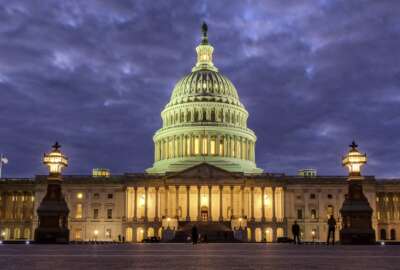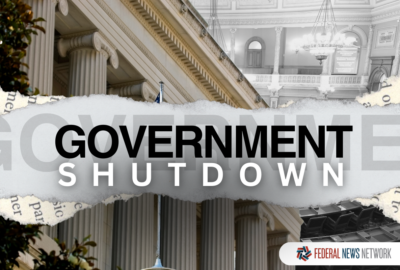What happens to federal pay and benefits during a government shutdown
Federal employees may have questions about what happens to their pay and benefits during a government shutdown. Federal News Network has compiled some answers.
With just hours for Congress to reach a spending agreement before it hits its deadline, agencies are bracing for a possible government shutdown at midnight Friday.
During a government shutdown, agencies that don’t yet have their funding determined by Congress are legally required to shutter all activities that are financed by appropriations.
The Office of Management and Budget is already preparing contingency plans in the case that there’s a lapse in appropriations. Nearly all agencies updated their contingency plans during the last threat of a government shutdown in 2023.
Many federal employees may have questions about what happens to their work, pay and benefits during a shutdown. Federal News Network has compiled some answers based on guidance from the Office of Personnel Management and other agency resources.
Pay for excepted, exempt, furloughed feds
Generally, each federal employee will fall into one of three categories: excepted, exempt or furloughed.
Excepted employees continue to work but are not paid until after the shutdown is over. They are guaranteed backpay once a shutdown ends.
Exempt employees, in contrast, continue to work and get paid as usual during a shutdown. They are employees who work in positions financed by funds other than annual appropriations.
A small number of employees working at non-appropriated fund agencies, however, are partially paid through appropriated funds, which may lead to some furloughs.
Furloughed employees — a third category of federal employees — stop working during a shutdown. They do not get paid until the end of the shutdown but are guaranteed backpay.
Federal employees who are excepted and continue to work during a shutdown are also still able to earn a premium pay rate for any overtime hours, Sunday hours, night hours, and all other types of premium payments. But again, employees will not see those payments until after a shutdown ends.
Agencies are responsible for updating their shutdown contingency plans to determine which employees fall into which of the three categories.
As for the timing of payment, federal employees who are furloughed or considered excepted can expect to be paid in retrospect once a government shutdown ends, according to a 2019 law.
If a shutdown occurs in the middle of a pay period, employees should still receive paychecks for any work they did prior to the start of the shutdown. Usually, a small number of payroll staff are excepted, and continue to work during a shutdown to process and issue the paychecks. And once a shutdown ends, federal payroll providers are expected to process checks immediately, regardless of when the next scheduled pay date is.
Federal contractors, on the other hand, may have to stop working during a shutdown. And in contrast to federal employees, contractors are not guaranteed backpay. It is up to each company to make the decision on pay for its employees once a shutdown ends.
Members of Congress, by law, receive their full paychecks throughout a government shutdown. Congressional support staff, however, generally do not receive pay during a shutdown, depending on if there is appropriated funding for legislative branch activities. The President also continues to receive a paycheck during a shutdown, as well as Supreme Court justices and all appointed justices.
What happens to feds’ paid leave?
Because the shutdown threat is occurring just ahead of the holiday season, federal employees may also have questions about taking leave.
Furloughed employees continue to accrue annual leave and sick leave as normal — as long as there was no other reason aside from a shutdown that the employee was put on a “non-pay” status, according to 2021 shutdown guidance from OPM. Excepted employees also continue to accrue leave as normal even though they aren’t being paid during a shutdown.
For those who were planning to take vacation during a potential shutdown, the use of paid leave varies by the category of employees. Excepted employees can take paid leave during a shutdown, as normal, through one of two options.
First, excepted employees could request time off and get approval from their supervisor. In this case, they would dip into their paid leave bank as usual.
But second, excepted employees could also be placed on “default furlough status” for any approved absence during a government shutdown. In those cases, agencies will not charge employees’ personal leave banks, and the approved leave hours would be considered “furloughed hours.”
In either case, excepted employees would still not receive pay for the leave hours until a shutdown ends.
Furloughed employees, however, cannot take paid leave during a shutdown. Any previously approved or scheduled time off will be canceled for furloughed employees. But again, they will be paid only after a shutdown ends.
Retirement applications and processing
Since December is a common time for federal employees to retire, there are may also be some questions particularly about how retirement processing works during a government shutdown.
Federal employees who are scheduled to retire either before or during a shutdown — and submit their retirement application to their agency before a shutdown begins — will still be considered retired. While OPM processes the application, retiring employees will begin receiving interim annuity payments, per usual.
Those who are already retired from the federal workforce will continue receiving their annuity payments with no interruptions.
But employees who are planning to submit their retirement applications this month may face a slightly different scenario. Feds should still be able to submit their retirement application during a shutdown, but it may take longer than usual for the application to be processed.
Since OPM Retirement Services is funded through a trust fund, RS staff continue working during a government shutdown. But OPM cannot begin processing an application until it receives the completed application from an employee’s home agency. During a shutdown, it’ll largely depend on if an individual agency decides to furlough employees working on retirement processing.
OPM said in instances where payroll employees at a feds’ employing agency are furloughed during a shutdown, processing can be delayed.
OPM offered further details on what happens to pay, leave, retirement, the Thrift Savings Plan and more in additional shutdown guidance from January 2024.
If you have further questions about how a government shutdown would impact federal employees, you can get in touch with Federal News Network by filling out our website comments form, or reaching out to us on X, Facebook or LinkedIn.
Copyright © 2025 Federal News Network. All rights reserved. This website is not intended for users located within the European Economic Area.
Drew Friedman is a workforce, pay and benefits reporter for Federal News Network.
Follow @dfriedmanWFED






